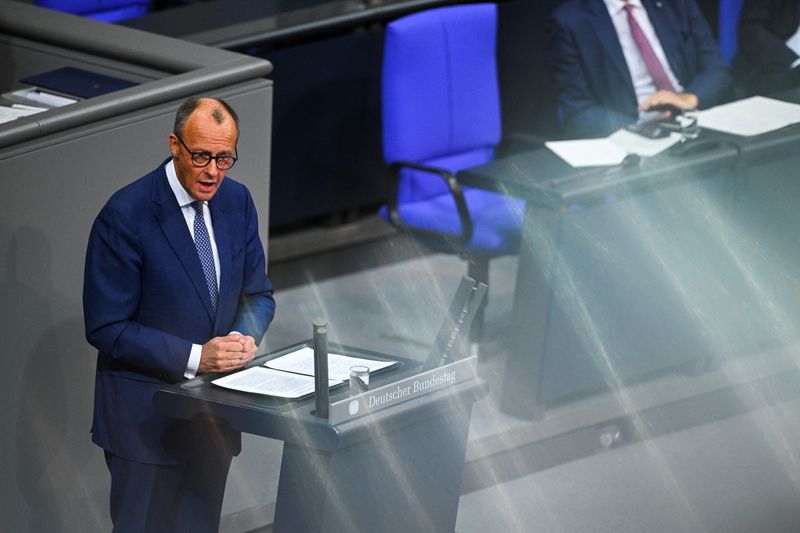By Andreas Rinke and Thomas Escritt
BERLIN (Reuters) - Germany can cover future increases in military spending without creating a special funding instrument, but must do more to coordinate defence with European allies, the frontrunner in the race to become Germany's next chancellor told Reuters.
Friedrich Merz, leader of the opposition conservatives, said a special fund like the 100 billion euros ($105 billion) in non-budgetary financing set aside by Chancellor Olaf Scholz's government to cover extra spending would not be necessary after a thorough review of the budget he would carry out on taking office.
Since Russia's full-scale invasion of Ukraine in 2022, Berlin has been under pressure to keep German defence spending above the NATO target of 2% of gross domestic product and to overhaul its defence capabilities.
"Right now I don't see any need to discuss a new special fund or extra debts," Merz told Reuters in an interview. "We need to review the books and then set new priorities."
German aid to Ukraine will be cut to 4 billion euros ($4.35 billion) in 2025 from around 8 billion euros in 2024.
Ten weeks from an early election in Germany, the conservatives enjoy a lead of at least 10 points in most polls over Scholz's Social Democrats, and Merz has been sharpening his foreign policy profile.
Scholz's three years in government were marked by turbulence and crisis-management after Russia's invasion of Ukraine, paired with rows between three ill-matched coalition parties over how to finance extra military spending.
Faced with the need to wean Europe's largest economy off Russian gas while setting aside money to arm Ukraine without violating Germany's stringent constitutional spending rules, the special funds were a way of squaring the circle.
Merz, confident it will be his job to form a government after the Feb. 23 vote, faces another possible upheaval with the return to the White House of President-elect Donald Trump, who promises to change the Ukraine policy of the U.S., until now Ukraine's biggest military backer.
Speaking on his return from Kyiv, where he met Ukraine's President Volodymyr Zelenskiy, and Warsaw, where he talked to Prime Minister Donald Tusk, Merz was eager to push his vision for a tight-knit European contact group to handle backing for Ukraine once Trump returns.
Among the changes needed would be more joint military spending by European allies, he said, though he declined to be drawn on whether European bonds could be issued to finance such spending, as some countries are demanding.
The contact group should, he said, include Poland, as a front-line state directly exposed to Russia's invasion of Ukraine as well as Britain and France, as the continent's two nuclear powers, and Germany, as the European Union's largest country.
Other states, such as Italy and Spain, should be "given the possibility" of also contributing, he added, but said that a narrow spearhead grouping would bring advantages.
"The important thing is to have a group of states that form a common opinion on how to approach the issue of Ukraine, especially in view of the coming change of government in the United States," he said.
The task of such a group, which could consist of experts rather than heads of governments, would be to conduct an assessment and see what was needed.

"It makes no sense for individual member states to come up with their own proposals: that applies for France, for Poland, for Britain and naturally for Germany too: nobody can manage this conflict alone," he said.
($1 = 0.9517 euros)